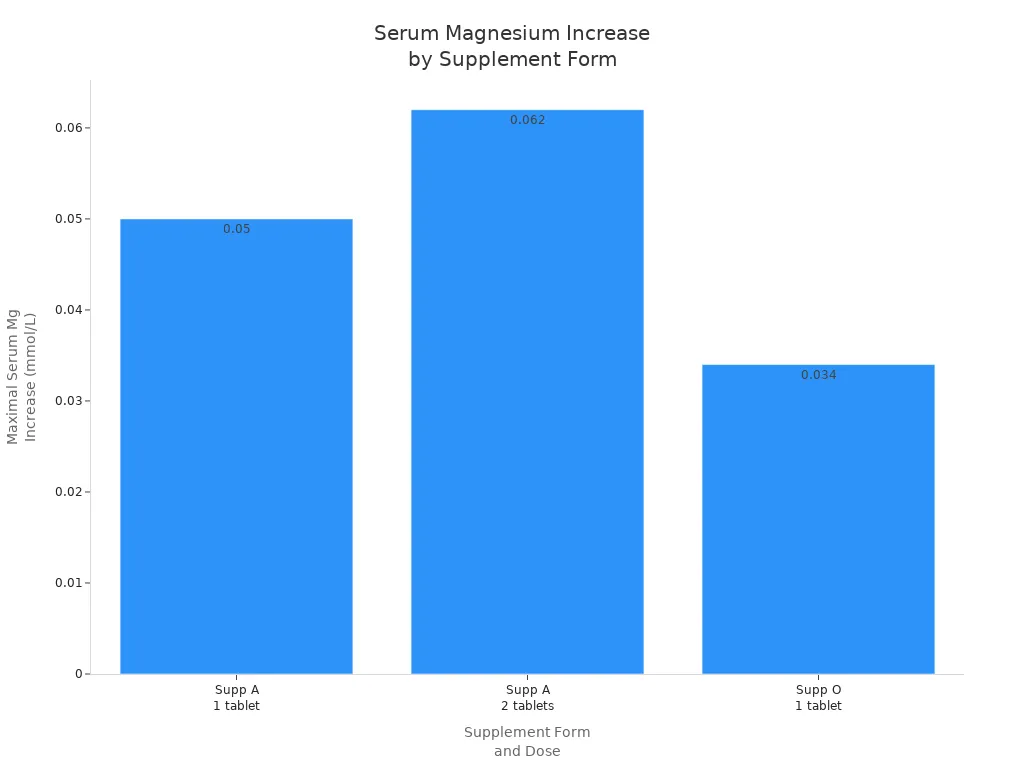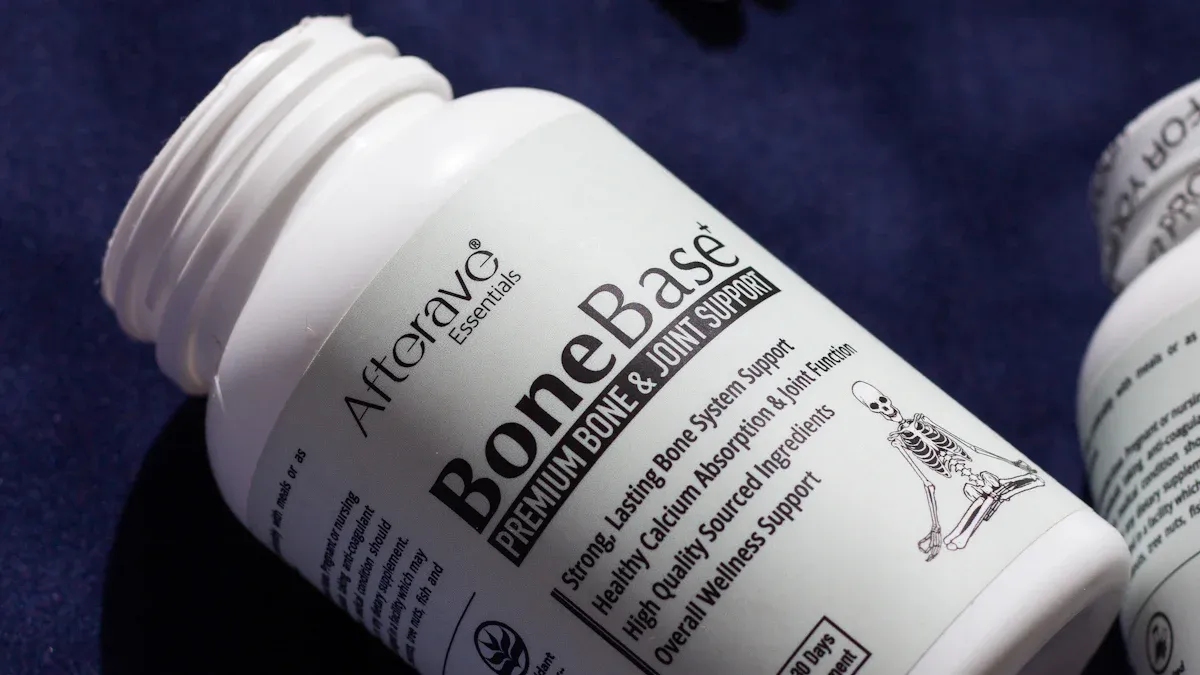
Supplement absorption bioavailability measures how well your body absorbs and uses nutrients from dietary supplements. You might assume all nutritional supplements work the same, but absorption rates vary widely. For example, your body absorbs 100% of vitamin C from small doses, but only about 60–75% from large doses, with the rest excreted. This means not every supplement delivers its promised benefits. Understanding supplement absorption bioavailability helps you choose supplements that truly support your health.
Aspect | Impact on Health |
|---|---|
Linked to lower risk of chronic diseases, but limited bioavailability affects recommendations. | |
Bioavailability factors | Influenced by nutrient structure, individual differences, environment, and microbiome. |
Medical Disclaimer: This information is for educational purposes only. You should consult a healthcare professional before making any changes to your supplement regimen.
Key Takeaways
Bioavailability shows how much of a supplement’s nutrient your body actually uses, not just absorbs.
Liquid and powder supplements absorb faster and better than tablets or capsules.
Taking supplements with the right foods and at the right times improves nutrient absorption.
Your age, health, diet, and genetics affect how well your body absorbs supplements.
Supporting gut health with probiotics and fiber boosts nutrient absorption.
Choose high-quality supplements with third-party testing for better effectiveness.
Avoid common mistakes like taking poorly absorbed forms or mixing competing nutrients.
Consult healthcare professionals to personalize your supplement plan and monitor results.
Supplement absorption bioavailability
Absorption vs. Bioavailability
You often hear the terms absorption and bioavailability when you read about dietary supplements. These words sound similar, but they describe different steps in how your body uses nutrients. Absorption is the process where your digestive system takes nutrients from a supplement and moves them into your bloodstream. Bioavailability goes further. It measures how much of the absorbed nutrient actually reaches the tissues where your body needs it.
Bioavailability is defined as the degree and rate at which a compound is absorbed into your body or made available at the site of biological activity. For dietary supplements, bioavailability shows the percentage of a nutrient that enters your bloodstream and becomes available for use. High bioavailability means your body can use most of the nutrient. Low bioavailability means much of it passes through without benefit.
Absorption is only the first step. After absorption, your body must transport, metabolize, and deliver the nutrient to the right place. Many factors affect both absorption and bioavailability, such as your age, digestive health, and the timing of intake. For example, calcium has an absorption rate between 25 and 35 percent. This means if you take a calcium supplement, only about a quarter to a third of the dose gets absorbed, and even less may be available for your bones.
Tip: When you choose a supplement, look for information about both absorption and bioavailability. These details help you understand how much of the nutrient your body can actually use.
Why Bioavailability Matters
Bioavailability is a key factor in supplement absorption bioavailability. It determines how much of a nutrient from a supplement is absorbed and used by your body. Nutrition experts say that the presence of a nutrient in a supplement does not guarantee health benefits. The nutrient must be bioavailable to support your health.
Bioavailability affects the efficacy of dietary supplements. If a nutrient is not bioavailable, your body cannot use it, and the supplement will not work as promised.
Many things influence bioavailability, including the chemical form of the nutrient, how you take the supplement, your digestive health, and your individual physiology.
Maximizing bioavailability helps you get the most benefit from your supplements. You can improve bioavailability by choosing the right nutrient forms, taking supplements with food, and avoiding negative nutrient interactions.
Note: Bioavailability varies more for micronutrients like vitamins and minerals than for macronutrients such as protein or carbohydrates.
For a nutrient to help your body, it must be absorbed, metabolized, and delivered to the target tissue. Limited bioavailability can reduce the effectiveness of supplements and functional foods. Understanding supplement absorption bioavailability helps you make smarter choices and get the most from your investment in health.
Differences in Absorption Rates Among Supplement Forms and Nutrients
Not all supplements absorb at the same rate. The form of the supplement affects how quickly and how much of the nutrient your body can use. Liquids absorb fastest because they are already dissolved. Powders also absorb quickly, while capsules and tablets take longer because your body must break down their outer shell.
Supplement Form | Absorption Rate | Bioavailability | Key Factors Affecting Absorption | Pros | Cons |
|---|---|---|---|---|---|
Liquids | Fastest | Highest | Already dissolved, no breakdown needed | Rapid nutrient uptake, customizable dosage, easy swallowing | Shorter shelf life, taste issues, portability, higher cost |
Powders | Fast | High | Dissolve quickly in liquids, no casing | Flexible dosage, better mixing, no fillers/binders | Taste/texture issues, storage, preparation needed |
Capsules | Slowest | Lower | Must break down outer casing first | Convenient, no mixing, longer shelf life, no taste issues | Slower absorption, potential digestive issues, fixed dosage |
Liquids and liposomal formulations often have better absorption and bioavailability than tablets or capsules. For example, liposomal vitamin C is wrapped in fat molecules, which helps it enter your cells directly and bypass digestive breakdown. Magnesium glycinate and magnesium malate absorb better and cause fewer digestive side effects than magnesium oxide.

Timing and dietary context also matter. Water-soluble vitamins like vitamin C absorb better on an empty stomach. Minerals such as magnesium may need acidic forms, like citrate, for improved uptake.
Callout: The delivery method, nutrient form, and your digestive health all play a role in supplement absorption bioavailability. When you select a supplement, consider these factors to maximize your results.
Factors affecting supplement bioavailability

Nutrient Form
Chemical Structure
You might wonder why some supplements work better than others. The chemical structure of a nutrient plays a major role in how your body absorbs and uses it. Nutrient absorption depends on how the nutrient interacts with transporters in your intestinal cells. Hydrophilic nutrients need special transporters because they cannot pass through lipid membranes. The number and affinity of these transporters, along with the nutrient’s ability to form soluble or insoluble complexes, affect absorption efficiency.
For example, heme iron absorbs more easily than non-heme iron. Its chemical structure allows it to enter your cells intact, making it a form with high bioavailability. Minerals also show differences. Monovalent minerals, such as sodium and potassium, absorb better than multivalent ones like calcium and magnesium. The chemical structure decides if absorption happens through passive diffusion or active transport. Food components can also change absorption by altering solubility or transporter access.
Tip: Choose bioavailable supplements with chemical structures that match your body’s absorption mechanisms for better results.
Supplement Types (Liquid, Powder, Tablet)
The type of supplement you choose affects how much of the nutrient your body can use. Liquid supplements are pre-dissolved, so your body absorbs them faster. Sublingual liquids enter your bloodstream directly, skipping the digestive system and increasing bioavailability. Pills and capsules need your body to break down coatings and additives before absorption, which can lower the effective dose.
Powders dissolve quickly in liquids, offering high absorption rates. Tablets and capsules take longer because your digestive system must break down their outer shell. Liquid vitamins often contain fewer fillers, which improves absorption. Advanced technologies like liposomal encapsulation can double the absorption rate of liquid supplements compared to standard forms. These innovations help you get high bioavailability and maximize effectiveness.
Supplement Type | Absorption Speed | Bioavailability | Notes |
|---|---|---|---|
Liquid | Fastest | Highest | Pre-dissolved, fewer fillers, sublingual options |
Powder | Fast | High | Dissolves quickly, flexible dosing |
Tablet/Capsule | Slowest | Lower | Requires breakdown, more additives |
Callout: If you want high absorption and better nutrient bioavailability, consider liquid or powder supplements over tablets.
Food and Nutrient Interactions
With or Without Food
The timing of supplement intake matters. Some supplements absorb better with food, while others work best on an empty stomach. For example, water-soluble vitamins like vitamin C absorb more efficiently when taken without food. Fat-soluble vitamins, such as vitamin D and E, need dietary fat for optimal absorption.
Calcium absorption improves when you consume dairy products. Components like phosphopeptides, casein, and whey proteins protect calcium and increase its solubility. On the other hand, compounds in vegetables, such as oxalate and phytic acid, can block mineral absorption by forming complexes your body cannot digest.
Enhancers and Inhibitors
Certain foods and substances can boost or block nutrient absorption. Vitamin C acts as an absorption enhancer for non-heme iron. It increases iron solubility and helps convert it to a form your body can absorb. Herbal bioenhancers like ginger, garlic, cumin, and aloe vera also improve bioavailability through various mechanisms.
Some substances act as inhibitors. Drug efflux pumps, such as P-glycoprotein, actively transport nutrients out of cells, reducing absorption efficiency. Compounds like oxalate and phytic acid in plant foods can lower mineral bioavailability.
Category | Examples and Details | Mechanism / Notes |
|---|---|---|
Surfactants (sodium caprate), medium chain fatty acids, bile salts, vitamin C, herbal bioenhancers (ginger, garlic, cumin, aloe vera) | Increase membrane permeability, solubility, inhibit efflux pumps, regulate intestinal function | |
Absorption Inhibitors | Drug efflux pumps (P-glycoprotein), oxalate, phytic acid | Reduce absorption by transporting nutrients out of cells or forming indigestible complexes |
Note: Understanding absorption enhancers and inhibitors helps you design a diet that supports high bioavailability of essential nutrients.
Digestive Health
Stomach Acid and Enzymes
Your digestive health directly affects supplement bioavailability. Stomach acid breaks down food and supplements, preparing nutrients for absorption. Low stomach acid, common in older adults and those using acid-suppressing drugs, leads to poor digestion and reduced absorption of proteins and micronutrients. Betaine HCl supplements can help lower stomach pH during meals, improving digestion and nutrient absorption.
Digestive enzymes, produced in your mouth, stomach, pancreas, and small intestine, break down carbohydrates, proteins, and fats. Enzyme insufficiency, seen in conditions like cystic fibrosis or pancreatitis, can impair digestion and nutrient absorption. Most healthy people do not need enzyme supplements. A balanced diet supports natural enzyme production and optimal absorption.
Tip: Support your gut health by eating a balanced diet and monitoring digestive symptoms. If you suspect low stomach acid or enzyme issues, consult a healthcare professional.
Gut Microbiome
Your gut microbiome plays a vital role in nutrient bioavailability. Gut microbes metabolize dietary fibers into short-chain fatty acids, which enhance supplement bioavailability. The microbiome also helps synthesize essential nutrients like vitamin K and B vitamins. It influences mineral absorption by releasing enzymes that help your body absorb calcium, iron, zinc, magnesium, and phosphorus.
Micronutrient supplementation can change your microbiome, favoring beneficial bacteria such as Bifidobacterium and Lactobacillus. Microbial fermentation produces substances that improve absorption of micronutrients. The relationship between your microbiome and nutrient absorption is bidirectional. Improving gut health can help you get the most from your supplements.
Medical Disclaimer: This information is for educational purposes only. You should consult a healthcare professional before making any changes to your supplement regimen.
Host Factors
Age, Gender, Physiology
Your age, gender, and physical condition all influence how your body absorbs and uses nutrients from supplements. These host factors can change the effectiveness of your supplement routine. You need to understand how these differences affect nutrient bioavailability so you can make better choices.
Host Factor | Influence on Supplement Bioavailability |
|---|---|
Age | Different stages of life affect absorption. Infants absorb iron and zinc well from human milk, but need other sources after six months. Adolescents need more calcium for bone growth. Older adults may have lower stomach acid, which reduces absorption of some nutrients. |
Gender | Gender differences matter, especially during adolescence. Girls reach peak calcium absorption and bone building near their first period. Boys and girls may need different amounts of minerals at different ages. |
Physiological State | Premature infants or those with low birth weight need special supplement timing and dosage. Your nutritional status and health conditions also affect bioavailability. |
You may notice that your body absorbs nutrients differently as you age. Children and teens need more minerals for growth. Adults may need to adjust supplement choices as their digestive systems change. Women and men have different needs for minerals like calcium and iron, especially during puberty and pregnancy. If you have a health condition, your body may not absorb nutrients as well, so you might need to change your supplement plan.
Animal-based nutrients usually have higher bioavailability than plant-based nutrients. Your body digests animal proteins more easily because they lack the antinutritional factors found in plants. Plant proteins contain substances like phytic acid and protease inhibitors, which block absorption and lower nutrient bioavailability. Processing methods such as soaking or heating can improve digestibility, but plant proteins still do not match the bioavailability of animal proteins.
Vegetarians and vegans often have lower levels of nutrients like vitamin B12, vitamin D, iodine, iron, and zinc. These nutrients are more bioavailable in animal foods. If you follow a plant-based diet, you may need to pay extra attention to your supplement choices to avoid deficiencies. Animal-derived foods provide higher quality protein and nutrients with greater bioavailability. Some nutrients, such as vitamin B12, are only found in animal foods. Replacing animal foods with plant foods without careful planning can reduce your overall nutrient bioavailability.
Tip: Consider your age, gender, and health status when choosing supplements. If you follow a plant-based diet, look for supplements that address common gaps in nutrient bioavailability.
Supplement Quality
The quality of your supplements affects how well your body absorbs and uses nutrients. High-quality supplements use better ingredient forms and manufacturing methods, which improve bioavailability. You should look for products that meet strict standards for purity and effectiveness.
Supplement bioavailability depends on the chemical form of the nutrient, the way the product is made, and how quickly it dissolves in your body. For example, some fillers in tablets slow down disintegration, which lowers absorption. Different mineral forms, such as calcium carbonate and calcium citrate, have different absorption rates. Regulatory standards like USP dissolution tests help ensure that supplements release nutrients properly, which supports better bioavailability.
The chemical form of the nutrient, the product formulation, and manufacturing methods all affect bioavailability.
Chelated minerals and coenzymated vitamins absorb better, but they cost more to produce.
Purity matters. Third-party testing ensures that supplements contain only the ingredients listed and no harmful contaminants.
Certificates of analysis (COA) and third-party certification provide proof of quality and purity.
Without quality assurance, supplements may contain unwanted substances that block absorption or cause health problems.
You should choose supplements that have third-party certification and a COA. These documents show that the product meets high standards for purity and effectiveness. High-quality supplements dissolve and disintegrate properly, which helps your body absorb nutrients and improves nutrient bioavailability.
Note: Always check for third-party testing and certification when buying supplements. Quality products support better absorption and help you get the most benefit from your supplement routine.
Medical Disclaimer: This information is for educational purposes only. You should consult a healthcare professional before making any changes to your supplement regimen.
Maximizing nutrient absorption
Choosing the Right Form
You want your supplements to work as efficiently as possible. Start by selecting high-quality supplements that use clinically tested forms. These forms have proven absorption rates and safety profiles. Look for products with third-party testing to ensure purity and potency. Assess your personal needs with a healthcare professional before choosing a supplement. Consider your lifestyle and dietary restrictions. Capsules, powders, and liquids offer different benefits. Liquids and powders often provide faster delivery and higher absorption. Advanced delivery technologies, such as liposomal and nano-encapsulation, protect nutrients from digestive breakdown. These methods help nutrients reach your cells and tissues for optimal bioavailability. Liposomal delivery systems use lipid vesicles to shield active ingredients, allowing them to fuse with cell membranes and improve absorption. This technology works well for antioxidants, herbal extracts, and omega-3 fatty acids. You get better results with lower dosages and fewer side effects.
Tip: Always check for third-party certification and choose supplements that match your individual health needs.
Timing and Dosage
Maximizing nutrient absorption depends on when and how you take your supplements. Take multivitamins with food to reduce stomach upset and improve absorption. Space out mineral supplements like calcium, zinc, and magnesium by taking them at different meals. Calcium and iron compete for absorption, so take them at least two hours apart. Pair fat-soluble vitamins (A, D, E, K) with healthy fats to boost their uptake. Iron absorbs best on an empty stomach, especially when combined with vitamin C-rich foods. Avoid tea, coffee, and milk with iron-rich meals because they contain compounds that block iron absorption. Follow recommended dietary allowances to avoid toxicity. More is not always better. Use cooking methods like steaming vegetables to preserve water-soluble vitamins. These strategies help you get the most from your supplements and support optimal bioavailability.
Supplement | Best Timing | Dosage Tips | Interaction Notes |
|---|---|---|---|
Iron | Empty stomach, morning | Pair with vitamin C | Avoid with calcium, tea, coffee |
Calcium | After meals, daytime | Combine with vitamin D, K | Space out from iron by 2 hours |
Supporting Gut Health
Your gut health plays a major role in maximizing nutrient absorption. Include probiotic-rich foods and beverages like kefir and kombucha in your diet. These support a healthy gut microbiome, which helps your body absorb minerals such as calcium, magnesium, and zinc. Soluble, gel-forming fibers like psyllium and guar gum improve gut function and slow nutrient absorption, allowing more nutrients to reach your cells. These fibers also help control blood sugar and lower cholesterol. Stress reduction and adequate sleep further support gut health and nutrient uptake. Choose high-quality supplements that work with your digestive system for better results.
Note: Maintaining gut health with fiber and probiotics helps your body absorb nutrients more efficiently.
Medical Disclaimer: This information is for educational purposes only. You should consult a healthcare professional before making any changes to your supplement regimen.
Avoiding Common Mistakes
You want your supplements to work for you, but common mistakes can lower their effectiveness. Many people do not realize how small errors in supplement choice or routine can make a big difference in nutrient absorption. By learning what to avoid, you can get more value from your supplements and support your health goals.
One of the most frequent mistakes is choosing supplement forms with poor absorption. For example, magnesium oxide and zinc oxide are popular because they cost less, but your body absorbs very little from these forms. You might take the right dose, but your body cannot use most of it. Instead, look for forms like magnesium glycinate or zinc picolinate, which offer higher bioavailability.
Selecting the wrong delivery format also reduces absorption. Some nutrients work best in liquid or powder form, while others need special coatings or encapsulation. If you have trouble swallowing pills, you might not absorb enough from tablets or capsules. Children and older adults often benefit from liquids or chewables. Always match the supplement type to your needs and preferences.
Many people overlook how nutrients interact with each other. Some vitamins and minerals work better together. For example, vitamin D helps your body absorb calcium, and vitamin C boosts iron absorption. If you ignore these synergistic effects, you may not get the full benefit from your supplements. On the other hand, some combinations can block absorption. Calcium and iron compete for uptake, so you should not take them at the same time.
Digestive health plays a key role in nutrient absorption. If you have low stomach acid or poor gut health, your body may not break down supplements properly. Skipping steps to support your digestion, such as eating a balanced diet or including probiotics, can limit the benefits of your supplements.
Another mistake is not checking for product quality or testing. Some supplements do not contain the amount of active ingredient listed on the label. Others may not dissolve well, which means your body cannot absorb them. Look for third-party testing and certificates of analysis to make sure you get what you pay for.
Tip: Always read supplement labels carefully. Choose high-quality products, and pay attention to how and when you take your supplements. Small changes can make a big difference in how well your body absorbs nutrients.
Medical Disclaimer: This information is for educational purposes only. You should consult a healthcare professional before making any changes to your supplement regimen.
Personalizing supplement bioavailability
Genetics and Individual Needs
Your genes play a big role in how your body absorbs and uses nutrients from supplements. Genetic differences, such as single nucleotide polymorphisms (SNPs), can change how well you process vitamins and minerals. For example, changes in the SCAR-B1 gene affect how your body takes up vitamin E. Variants in vitamin C transport genes can impact your vitamin C levels. The MTHFR gene influences how you use B-complex vitamins. These genetic factors explain why you may respond differently to the same supplement as someone else. Genetic testing can help you discover these differences. Some programs use genetic and micronutrient testing to create personalized supplement plans. By understanding your genetic profile, you can choose supplement forms and dosages that match your needs and improve your nutritional status.
Lifestyle and Diet
Your daily habits and food choices have a strong effect on supplement absorption. People who are older, more active, or have higher education often use supplements more regularly. Smoking and obesity can lower your body’s ability to absorb nutrients. A healthy diet with more fruits, fiber, and less fat supports better supplement use and absorption. You need healthy fats in your meals to absorb fat-soluble vitamins like A, D, E, and K. Intense exercise may reduce nutrient absorption if you do not time your supplements well. Stress can slow digestion and block nutrient uptake. Caffeine and alcohol can also lower absorption, so you should space out your intake and use moderation. Some medications and health conditions may change how your body absorbs nutrients. If you have a higher body mass index, you may not absorb nutrients as well. Paying attention to these factors helps you maintain a strong nutritional status and get the most from your supplements.
Key lifestyle tips for better supplement absorption:
Eat a balanced diet with plenty of fruits and fiber.
Include healthy fats for fat-soluble vitamins.
Avoid smoking and limit alcohol.
Manage stress and get enough sleep.
Space out caffeine and supplements, especially iron.
Consulting Professionals
You should work with healthcare professionals to personalize your supplement plan. Experts recommend starting with micronutrient testing to check your nutritional status. Blood tests can show if you have any deficiencies or imbalances. Choose a reputable lab for accurate results. Genetic testing can reveal how your body processes different nutrients. Your healthcare provider will use this information, along with your health history and lifestyle, to suggest the best supplement forms and dosages for you.
Use micronutrient testing and genetic testing to identify your unique needs.
Select supplements that match your genetic profile and nutritional status.
Watch for possible interactions between supplements and medications.
Monitor your progress with regular follow-up tests and adjust your plan as needed.
Note: Special groups, such as pregnant women, children, and older adults, need extra care when choosing supplements. Regular monitoring helps you stay healthy and avoid problems.
Medical Disclaimer: This information is for educational purposes only. It does not replace medical advice. Always consult a healthcare professional before making changes to your supplement regimen.
Signs of poor nutrient absorption

Recognizing Ineffective Supplementation
You may take supplements every day, but your body might not absorb the nutrients as expected. Signs of poor nutrient absorption often appear as subtle changes in your health. You should watch for these symptoms, as they can signal that your supplements are not working as intended.
Fatigue or low energy, especially if you take iron or magnesium
Muscle weakness or cramps, which may point to vitamin D or magnesium issues
Frequent infections or slow recovery, often linked to zinc or vitamin C deficiency
Hair loss or brittle nails, which can result from low levels of biotin, iron, or zinc
Bleeding gums, a sign of vitamin C deficiency
Oral sores, which may relate to low vitamin B3 or B12
Mood changes or low mood, sometimes caused by vitamin B6, B12, or D deficiencies
You may also notice digestive symptoms. Light-colored, bulky stools that float can mean poor fat absorption. Bloating, gas, or diarrhea may signal trouble with certain sugars. If you see dry hair, hair loss, or swelling, your body may not absorb enough protein.
Nutrient Type | Common Signs and Symptoms of Poor Absorption |
|---|---|
Fats | Light-colored, foul-smelling, bulky, soft stools that float or stick to toilet |
Protein | Dry hair, hair loss, fluid retention (edema) |
Certain Sugars | Bloating, gas, explosive diarrhea |
Certain Vitamins | Anemia, malnutrition, low blood pressure, weight loss, muscle wasting |
General Effects | Stopping menstruation, poor growth in children, food avoidance |
If you experience these symptoms, your nutritional status may be at risk. You should not ignore these warning signs, as they can lead to bigger health problems over time.
When to Reevaluate
You need to reevaluate your supplement routine if you notice ongoing symptoms or if your health does not improve. Sometimes, even with regular supplement use, your nutritional status may not reflect the benefits you expect. Laboratory tests can help, but you should know that inflammation can affect test results. For example, inflammation may lower plasma levels of iron, zinc, or vitamin D, making it hard to judge your true nutritional status. Doctors often use micronutrient testing along with markers like C-reactive protein to get a clearer picture.
Clinical assessment matters, too. Your doctor will look at your symptoms, health history, and lab results together. Sometimes, your body may not absorb nutrients well because of gut health issues, infections, or metabolic differences. Children with poor growth may need extra protein or special amino acids in their supplements. Adults may need to address gut health or adjust supplement forms for better absorption.
If you suspect poor absorption, ask your healthcare provider about micronutrient testing. This can help you find gaps in your nutritional status and guide changes to your supplement plan. You may need to switch supplement types, improve your gut health, or address underlying health problems. Regular check-ins with your doctor help you track progress and make sure your supplements work for you.
Medical Disclaimer: This information is for educational purposes only. It does not replace medical advice. Always consult a healthcare professional before making changes to your supplement regimen.
Myths about bioavailability
Common Misconceptions
You may hear many claims about supplement bioavailability. Some sound convincing, but science tells a different story. Let’s look at some of the most common myths:
Tablets are less natural than other supplement forms. In reality, manufacturers can make tablets entirely from whole food ingredients without synthetic additives.
Tablets are difficult to digest. No clinical trials support this idea. Tablets can deliver nutrients just as effectively as other forms.
Excipients like magnesium stearate are harmful. This ingredient acts as a lubricant during manufacturing and breaks down into safe, normal components in your body.
All supplements are safe because they are natural. Not true. Some natural substances, like arsenic, are actually harmful.
You cannot overdose on vitamins. Scientific studies show that taking too much vitamin A can damage your liver, and too much vitamin B6 can harm your nerves.
Supplements are tightly regulated. The FDA does not pre-approve supplements. Oversight is limited, so some products may be unsafe or ineffective.
Supplements do not interact with medications. Some supplements, such as vitamin K, zinc, and omega-3s, can change how your medicines work.
Supplements always work well together. Some nutrients, like calcium and iron, compete for absorption. Taking them together can lead to low bioavailability for one or both.
Tip: Focus on the quality of ingredients and consult a healthcare provider before starting any new supplement. Do not rely on myths when making choices about your health.
Evidence-Based Facts
You can make better decisions about supplements when you know the facts. Scientific research helps you separate truth from fiction:
Tablets, powders, and liquids can all provide nutrients with high efficacy if they use quality ingredients and proper manufacturing methods.
The form of a supplement does not always determine how well your body absorbs it. Ingredient quality and your personal health matter more.
Magnesium stearate and other common excipients are safe in the amounts used in supplements.
Natural does not always mean safe. Some natural substances can cause harm, while some synthetic ingredients are safe and effective.
Overdosing on vitamins is possible. Always follow recommended dosages to avoid toxicity.
The FDA does not check every supplement before it reaches the market. You should look for third-party testing and certification.
Some supplements can interact with medications or with each other. For example, calcium can block iron absorption, which lowers the efficacy of both nutrients.
Professional guidance helps you avoid mistakes and get the most benefit from your supplements.
Medical Disclaimer: This information is for educational purposes only. It does not replace medical advice. Always consult a healthcare professional before making changes to your supplement regimen.
You can boost supplement absorption by choosing high-quality products, picking the right form, and supporting your gut health. Pay attention to timing and avoid common mistakes. Stay informed about what affects bioavailability. Take charge of your supplement routine and ask a healthcare professional for advice that fits your needs.
Medical Disclaimer: This blog is for educational purposes only. Always consult a healthcare professional before changing your supplement regimen.
FAQ
What does “bioavailability” mean for supplements?
Bioavailability shows how much of a nutrient your body absorbs and uses from a supplement. High bioavailability means your body gets more benefit from each dose.
Do liquid supplements absorb better than pills?
Yes, your body usually absorbs liquid supplements faster and more completely than pills. Liquids do not need to break down in your stomach first.
Can you increase supplement absorption by taking them with food?
You can improve absorption for some supplements by taking them with food. Fat-soluble vitamins like A, D, E, and K need dietary fat for best results.
Why do some people need different supplement forms?
Your age, health, and genetics affect how you absorb nutrients. Some people need special forms, like chelated minerals or sublingual tablets, for better results.
How do you know if your supplements are working?
Watch for changes in your energy, mood, and overall health. Blood tests and regular checkups help you track your nutrient levels and absorption.
Can you take too many supplements?
Yes, you can get too much of some nutrients. High doses may cause side effects or harm. Always follow recommended dosages and talk to a healthcare professional.
Do supplements interact with medications?
Some supplements can change how your medicines work. For example, calcium may block iron absorption. Always check with your doctor before starting new supplements.
Medical Disclaimer: This information is for educational purposes only. It does not replace medical advice. Always consult a healthcare professional before making changes to your supplement regimen.


